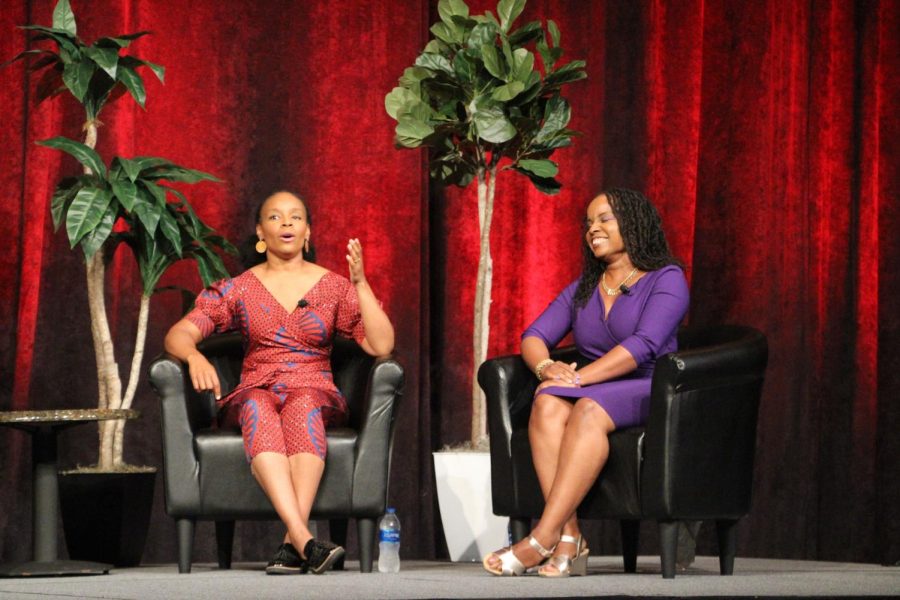Your donation will support the student journalists of Omaha Westside High School. Your contribution will allow us to purchase equipment and cover our annual website hosting costs.
Omaha natives return to talk about book detailing stories of racism
October 7, 2022
Sisters Amber Ruffin and Lacey Lamar discuss their experiences with racism while growing up in Omaha.
On Thursday, Sept. 1, Girls Inc. held a luncheon event called “Lunch for the Girls” featuring sisters Amber Ruffin and Lacey Lamar.
Ruffin and Lamar grew up in north Omaha and have been successful in their careers. Ruffin writes for “Saturday Night Live” while her sister Lamar has become co-author of the book “You’ll Never Believe What Happened to Lacey” and has dedicated more than 25 years in the healthcare and human health services field.
Lamar and Ruffin came back to speak with and support current Girls Inc. members. According to the Girls Inc. website, “Girls Inc. focuses on creating a ‘pro-girl’ environment and strives to help girls navigate gender, economic, and social barriers in order to produce educated and independent adults.”
Through the beginning of the presentation, Ruffin gave advice to current Girls Inc members.
“Sometimes people use your Blackness or womanhood to co-sign racist or sexist things,” Ruffin said. “Speak up as much as you can without getting in trouble. Please make sure to not rely on [others], but invite as many other people as possible to help you out.”
While promoting their book, the sisters shared how they dealt with racism in Omaha.
“My few little friends were mostly white, and they could not be there for me in the way that I needed them to be,” Ruffin said. “[When a racist incident occurred], [my family would] all strategize, then we would all sit around and have a round table where we [decided] what the best thing to do [was].”
Ruffin also discussed how watching Lamar go through these incidents influenced her to stand up for herself.
“Because she was my adult, how she handled things was just automatically how I would handle things,” Ruffin said. “You copy off your sister.”
Over the years, Lamar had been writing about her experiences with racism in the back of a journal. Eventually, she decided that those experiences had amassed enough to turn into a book.
“When [a co-worker] would say something racist, I would turn it to the back [of the journal] and write it down,” Lamar said. “I just [didn’t] want to work around that environment, and I was like, I’m gonna get this to stop, so when it was time to write the book, I [said] “It’s written, it’s [already] done.”
Lamar said that the book has made people realize how their actions are affecting others.
“I think it’s important for people to read the book, because once we wrote the book, I was shocked at how many people, especially white people, would come up to me and say, ‘Oh my God, I do that, I do that at work every day,’” Lamar said. “It blew me away that they recognized that they do it and that they’re choosing to say ‘I’m not doing it anymore.’ That’s wonderful for me.”
Ruffin noted how the conversational format of the book had an effect on people’s emotional response to the book.
“I wanted it to feel like Lacey and I were talking to you because it makes it go down easier,” Ruffin said. “When you talk in a conversational way, you’re a human being. It makes it harder to deny as we tell you all of these horrible things, [if] we talk to you like two regular guys.”
Ruffin ended the speech by giving more advice to her community.
“If you are organized with your paths and you’re talking to a person face-to-face, that’s absolutely a battle you can win,” Ruffin said. “You’re absolutely smart enough, you are absolutely fast enough. If someone says you’re a big baby, you are absolutely right and they are absolutely wrong. Speak up as much as you can without getting hurt or in trouble, and build that team around you. Have the confidence to say ‘This sucks.’”
Lamar has found comfort in her work, and believes that her book will continue to have an impact on the Omaha community and across the nation.
“Amber and I thought we had cured racism,” Lamar said. “[Then] this [book] came out and they’re still being racist. Things have not changed, but we hope that it has done some good. Sometimes it’s just a feeling of comfort, and now I know that I can go through it and these are my options.”

